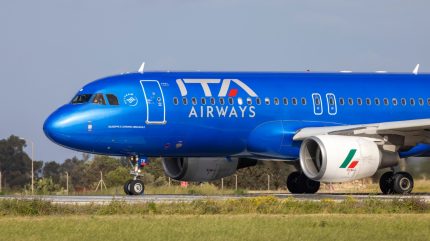
The EU has given the green light to the Lufthansa Group’s partial acquisition of Italy’s ITA Airways after months of back and forth on the €325m ($350m) deal.
The approval from the European Commission clears the path for the finalisation of Lufthansa’s acquisition of a 41% minority stake in the troubled Italian airline after an investigation by the body into competition concerns for the industry.
Lufthansa CEO Carsten Spohr said: “We look forward to welcoming ITA Airways and its outstanding employees as a new member of our airline family very soon. The decision is also a clear signal for strong air traffic in Europe, which can successfully assert itself in global competition.”
While the German airline giant welcomed the EU’s approval, Spohr also admitted it had come with “comprehensive and far-reaching concessions” to appease European regulators.
Commitments made by Lufthansa and the Italian Government, which owns ITA, include: the supply of assets to one or two rival airlines to run non-stop flights between Rome or Milan and central Europe, and the formation of interlining and slot swap agreement with rival airlines on specific long-haul routes.
Additionally, Lufthansa agreed to transfer more take-off and landing slots at Linate airport in Milan to a rival airline than would have been added to ITA’s control, allowing a rival airline to form a substantial base at the airport.
Margrethe Vestager, executive vice president in charge of competition policy at the European Commission, said: “We needed to prevent that passengers end up paying more or end up with fewer and lower quality air transport services on certain routes in and out of Italy.
“The package of remedies proposed by Lufthansa and the MEF on this cross-border deal fully addresses our competition concerns by ensuring that a sufficient level of competitive pressure remains on all relevant routes.”
In announcing the approval, the German company also revealed its timeline for the acquisition which will see the transaction close in Q4 2024, after which ITA’s flights will be immediately linked to Lufthansa’s network through code sharing.
Additionally, the company said ITA will retain its existing brand name, though its nearly 5,000 employees will be ‘swiftly’ integrated into the Lufthansa Group.
ITA Airways was bought by the Italian Government in 2020 after its predecessor Alitalia failed to find an alternative owner and it was believed likely to fail in the face of the Covid-19 pandemic-led industry shutdown.
While the government, which has invested more than $1bn to keep the airline afloat, will remain a majority owner when Lufthansa’s initial transaction closes, the deal is designed to see the company acquire ITA’s remaining shares over the coming years.
Following the EU’s announcement, Lufthansa’s shares have risen almost 4% as the industry signals its approval of the deal, despite the concessions made to get it over the line.
The exact nature of the deal will likely be taken as an indication of the future of other aviation deals in Europe including IAG’s proposed acquisition of Air Europa, which is also under investigation by the EU.


